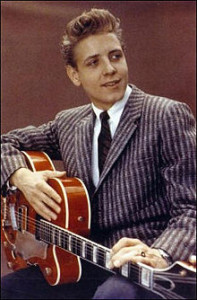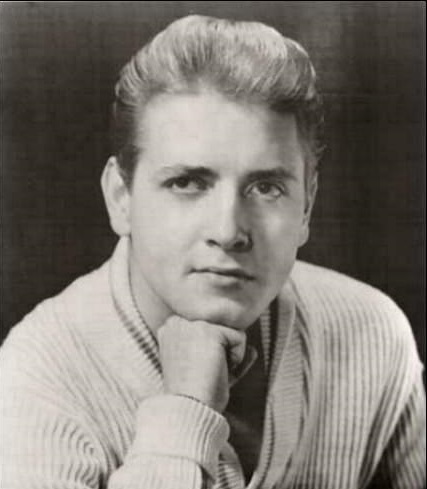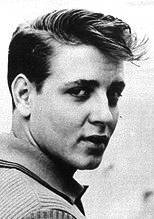BIOGRAPHICAL DETAILS
Description: Vocalist, Composer, USA
Known For: Known for the hit, Summer Time Blues
Instruments: Guitar, Voice
Music Styles: Rock
Location: United States of America
Date Born: 3rd October 1938
Location Born: Oklahoma City, Oklahoma, United States of America
Date Died: 17th April 1960
Location Died: London, United States of America
Cause Of Death: Automobile accident
Memorial: Eddie Cochran is interred in the Forest Lawn Memorial Park in Cypress, California. A posthumous album, My Way, was released in 1964.
YOUTUBE VIDEO
BIOGRAPHICAL PROFILE
Edward Raymond ‘Eddie’ Cochran (October 3, 1938 – April 17, 1960) was an American musician. Cochran’s rockabilly songs, such as “C’mon Everybody”, “Somethin’ Else”, and “Summertime Blues”, captured teenage frustration and desire in the late 1950s and early 1960s. He experimented with multitrack recording and overdubbing even on his earliest singles, and was also able to play piano, bass and drums. His image as a sharply dressed and good-looking young man with a rebellious attitude epitomized the stance of the 50s rocker, and in death he achieved an iconic status.
Cochran was born in Minnesota and moved with his family to California in the early 1950s. He was involved with music from an early age, playing in the school band and teaching himself to play blues guitar. In 1955, he formed a duet with the guitarist Hank Cochran (no relation), and when they split the following year, Cochran began a song-writing career with Jerry Capehart. His first success came when he performed the song “Twenty Flight Rock” in the movie The Girl Can’t Help It, starring Jayne Mansfield. Soon afterwards, Liberty Records signed him to a recording contract.
Cochran died aged 21 after a road accident, whilst travelling in a taxi in Chippenham, Wiltshire, during his British tour in April 1960, having just performed at Bristol’s Hippodrome theatre. Though his best-known songs were released during his lifetime, more of his songs were released posthumously. In 1987, Cochran was inducted into the Rock and Roll Hall of Fame. His songs have been covered by a wide variety of recording artists (see the “Style and Influence” section of this article for examples).
Cochran was born in Albert Lea, Minnesota, as Edward Raymond Cochran. His parents were from Oklahoma, and he always said in interviews that he was from Oklahoma. He took music lessons in school but quit the band to play drums. Also, rather than taking piano lessons, he began learning guitar, playing the country music he heard on the radio.
In 1953, Cochran’s family moved to Bell Gardens, California. As his guitar playing improved, he formed a band with two friends from his junior high school. He dropped out of Bell Gardens High School in his first year to become a professional musician. During a show featuring many performers at an American Legion hall, he met Hank Cochran (later a country music songwriter). Although they were not related, they recorded as The Cochran Brothers and began performing together. They recorded a few singles from Ekko that were not successful but helped to establish them as a performing act. Eddie Cochran also worked as a session musician and began writing songs, making a “demo” with Jerry Capehart, his future manager. In July 1956, Eddie Cochran’s first solo single was released on the Crest label. It featured the rocking “Skinny Jim” and is now regarded as a rockabilly classic. In the Summer of 1956, Boris Petroff asked Cochran if he would appear in the musical comedy film The Girl Can’t Help It. He agreed and sang a song called “Twenty Flight Rock” that was featured in the movie.
YOUTUBE
Later career (1957–1960)
In 1957, Cochran starred in his second film, Untamed Youth, and also had his first hit, “Sittin’ in the Balcony”, one of the few songs he recorded that were written by other songwriters (in this case John D. Loudermilk). “Twenty Flight Rock” was written by AMI staff writer Ned Fairchild (a pen name, her real name is Nelda Fairchild). Fairchild, who was not a rock and roll performer, merely provided the initial form of the song, and the co-writing credit reflects Cochran’s changes and contributions to the final product.
In November 1957, Liberty Records released Cochran’s only album released during his lifetime, Singin’ to My Baby. The album included Eddie’s first hit “Sittin’ in the Balcony”. There were only a few rockers on this album, and Liberty seemed to want to move Cochran more into the pop music direction. In 1958, however, Cochran seemed to find his stride in the famous teenage anthem “Summertime Blues” (co-written with Jerry Capehart). With this song, Cochran was established as an important influence on music in the late 1950s, both lyrically and musically. The song, released on Liberty recording No. 55144, charted at No. 8 on August 25, 1958. Cochran’s brief career included only a few more hits, such as “C’mon, Everybody”, “Somethin’ Else”, “Teenage Heaven”, and his posthumous UK number one hit “Three Steps to Heaven.” Eddie Cochran remained popular in the UK throughout the 1960s and scored more posthumous hits such as “My Way”, “Weekend” and “Nervous Breakdown”.
Another aspect of Eddie’s short but brilliant career is his work as backup musician and producer. He played guitar on tracks by Ray Stanley, Lee Denson, Baker Knight, Bob Denton, Galen Denny, Don Deal, Troyce Key, Mike Clifford, Paula Morgan, Jody Reynolds, Johnny Burnette, Wynn Stewart, Ernie Freeman, Elroy Peace, Derry Weaver, Eddie Daniels, Jewel Akens, John Ashley, Jack Lewis, Lynn Marshall, Jess Willard, The Holly Twins, Barry Martin and Al Casey. In 1959 he played lead for Skeets McDonald at Columbia’s studios for “You Oughta See Grandma Rock” and “Heart Breaking Mama”. In a session for Gene Vincent in March 1958 he contributed his trademark low bass voice as heard on Summertime Blues. The recordings were issued on the album A Gene Vincent Record Date.
In early 1959, two of Cochran’s friends, Buddy Holly and Ritchie Valens, along with the Big Bopper, were killed in a plane crash while on tour. Eddie’s friends and family later said that he was badly shaken by their deaths, and he developed a morbid premonition that he would also die young. It was shortly after their deaths that he wrote and recorded a tribute to them called “Three Stars”. He was anxious to give up life on the road and spend his time in the studio making music, thereby reducing the chance of suffering a similar fatal accident while touring. However, financial responsibilities required that he continue to perform live, and that led to his acceptance of an offer to tour the United Kingdom in 1960.
On Saturday, April 16, 1960, at about 11.50 p.m., while on tour in the United Kingdom, 21-year-old Cochran died as a result of a traffic accident in a taxi (a Ford Consul, not, as widely reported, a London hackney carriage) traveling through Chippenham, Wiltshire, on the A4. The speeding taxi blew a tire, lost control, and crashed into a lamp post on Rowden Hill, where a plaque now marks the spot. No other car was involved. Cochran, who was seated in the centre of the back seat, threw himself over his fiancée Sharon Sheeley, to shield her, and was thrown out of the car when the door flew open. He was taken to St. Martin’s Hospital, Bath, where he died at 4:10 p.m. the following day of severe head injuries. Cochran’s body was flown home and his remains were buried on April 25, 1960, at Forest Lawn Memorial Park in Cypress, California.
Songwriter Sharon Sheeley and singer Gene Vincent survived the crash, Vincent sustaining lasting injuries to an already permanently damaged leg that would shorten his career and affect him for the rest of his life. The taxi driver, George Martin, was convicted of dangerous driving, fined £50, disqualified from driving for 15 years, and sentenced to prison for six months (although by some accounts he served no prison sentence). His driving licence was reinstated in 1969. The car and other items from the crash were impounded at the local police station until a coroner’s inquest could be held. David Harman, a police cadet at the station who would later become known as Dave Dee of the band Dave Dee, Dozy, Beaky, Mick & Tich, taught himself to play guitar on Cochran’s impounded Gretsch. Earlier in the tour, the same guitar had been carried to the car for Cochran by the 12-year old Mark Feld, later known as Marc Bolan of T. Rex, who would himself die in a car crash in 1977.
A memorial stone to commemorate Eddie Cochran can be found in the grounds of St Martin’s Hospital in Bath. The stone was restored in 2010 (on the 50th anniversary of his death) and can be found in the old chapel grounds at the Hospital. A memorial plaque can also be found next to the sundial at the back of the old chapel
Posthumous releases and honors
A posthumous album, My Way, was released in 1964.
Cochran was a prolific performer, and the British label Rockstar Records has released more of his music posthumously than had been released during his life. The company is still looking for unpublished songs.
One of his posthumous releases was “Three Stars,” a tribute to J.P. Richardson, better known as The Big Bopper, and Eddie’s friends Buddy Holly and Ritchie Valens, who had all died together in a plane crash just one year earlier. Written just hours after the tragedy by disc jockey Tommy Dee, it was recorded by Cochran two days later (Dee recorded his own version several weeks later). His voice broke during the spoken lyrics about Valens and Holly.
In 1987, Cochran was inducted into the Rock and Roll Hall of Fame. His pioneering contribution to the genre of rockabilly has also been recognized by the Rockabilly Hall of Fame. Several of his songs have been rereleased since his death, such as “C’mon Everybody,” which was a number 14 hit in 1988 in the UK. Rolling Stone ranked him number 84 on their 2003 list of the 100 greatest guitarists of all time.
Cochran’s life is chronicled in several publications, including Don’t Forget Me—The Eddie Cochran Story, written by Julie Mundy and Darrel Higham (ISBN 0-8230-7931-7), and Three Steps to Heaven, written by Bobby Cochran (ISBN 0-634-03252-6).
On June 2, 2008, The Very Best of Eddie Cochran was released by EMI Records.
Guitars
When playing with Hank Cochran, Eddie Cochran played a Gibson L-4C archtop acoustic guitar with a florentine cutaway and a DeArmond ‘Rhythm Chief’ pickup, which can be clearly seen in the Cochran Brothers publicity photograph.
Later, Cochran moved to a 1955 Gretsch 6120 Chet Atkins G-brand Western model, which Eddie had modified. He replaced the neck position De Armond Dynasonic pickup with a black covered Gibson P-90 pickup. He also used Martin acoustic guitars.
Discography
Chart positions are from the Billboard Hot 100.
U.S. singles
“Two Blue Singin’ Stars” b/w “Mr Fiddle” (June 1955) as The Cochran Brothers
“Your Tomorrows Never Come” b/w “Guilty Conscience” (July 1955) as The Cochran Brothers
“Walkin’ Stick Boogie” b/w “Rollin'” (January 1956) as Jerry Capehart featuring Cochran Brothers
“Tired and Sleepy” b/w “Fool’s Paradise” as Cochran Brothers
“Skinny Jim” b/w “Half Loved” (July 1956)
“Sittin’ in the Balcony” b/w “Dark Lonely Street” (February 1957) Chart no. 18
“One Kiss” b/w “Mean When I’m Mad” (May 1957)
“Drive In Show” b/w “Am I Blue” Liberty F55087 (July 1957) Chart no. 82
“Twenty Flight Rock” b/w “Cradle baby” (November 1957)
“Jeannie Jeannie Jeannie” b/w “Pocketful of Hearts” (January 1958) Chart no. 94
“Teresa” b/w “Pretty Girl” (May 1958)
“Summertime Blues” b/w “Love Again” Liberty F55144 (July 1958) Chart no. 8
“C’mon Everybody” b/w “Don’t Ever Let Me Go” Liberty F55166 (October 1958) Chart no. 35
“Teenage Heaven” b/w “I Remember” Liberty 55177 (February 1959) Chart no. 99
“Somethin’ Else” b/w “Boll Weevil Song” Liberty 55203 (July 1959) Chart no. 58
“Hallelujah I Love Her So” b/w “Cradle Baby” (November 1959)
“Cut Across Shorty” b/w “Three Steps To Heaven” (March 1960)
“Lonely” b/w “Sweetie Pie” (August 1960)
“Lonely” b/w “Weekend” (December 1961)
U.S. albums
Singin’ to My Baby Liberty LRP-3061 (November 1957)[19]
12 of His Biggest Hits Liberty LRP-3172 (April 1960) reissued as The Eddie Cochran Memorial Album (May 1960)
Never to Be Forgotten Liberty LRP-3220 (January 1962)[19]
Summertime Blues Sunset SUS-5123 (August 1966)
Legendary Masters Series United Artists UAS 9959 (January 1972)
The Very Best of Eddie Cochran (1975)
Great Hits (1983)
On The Air (1987)
The Best of Eddie Cochran (1987)
Greatest Hits Curb Records (1990)
Singin’ to My Baby and Never to Be Forgotten EMI Records (1993)
UK albums
Singin’ To My Baby (July 1958)
The Eddie Cochran Memorial Album (September 1960)
Cherished Memories (December 1962)
My Way (September 1964)
The Legendary Eddie Cochran (June 1971)
The Many Sides of Eddie Cochran (1974)
20th Anniversary Album (March 1980)
The Best of Eddie Cohran Liberty-EMI U.K. (1985) (The mono 16 track LP/cassette is from the Rock ‘N’ Roll Masters series.)
The Very Best of Eddie Cochran (June 2008)
Eddie Cochran Story (6 July 2009)
CONTACT DETAILS
Web Site:
From Wikipedia, the free encyclopedia



